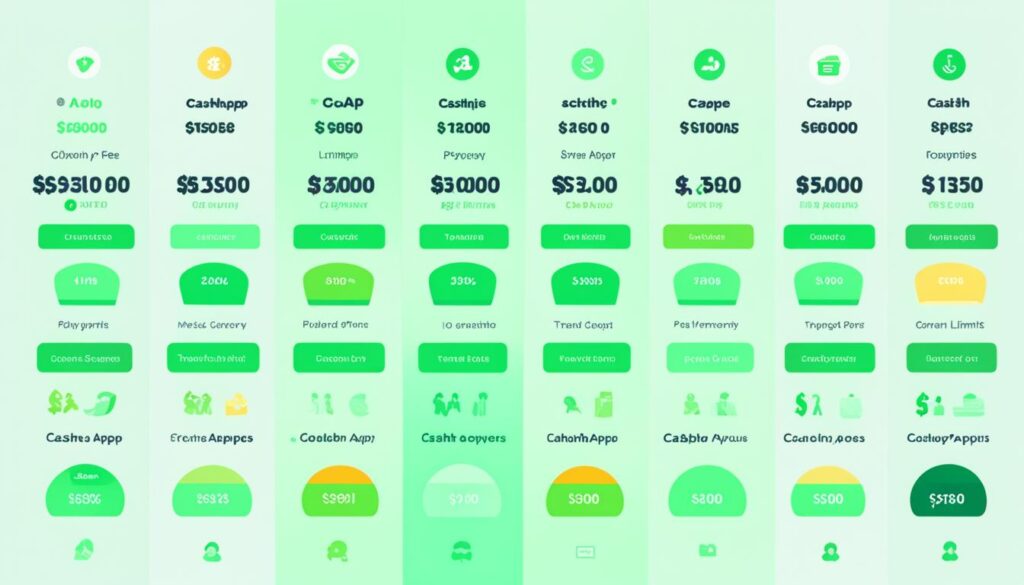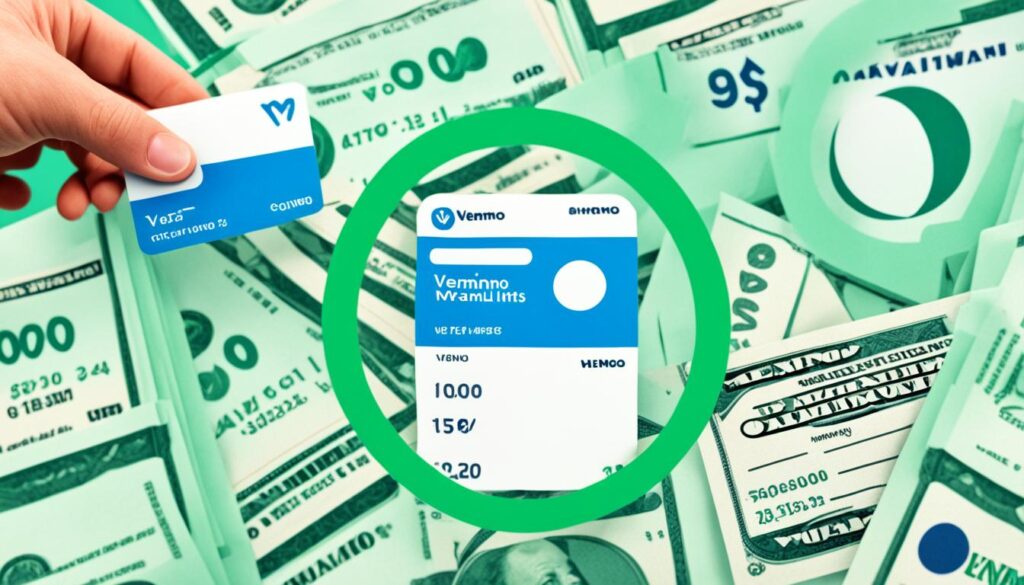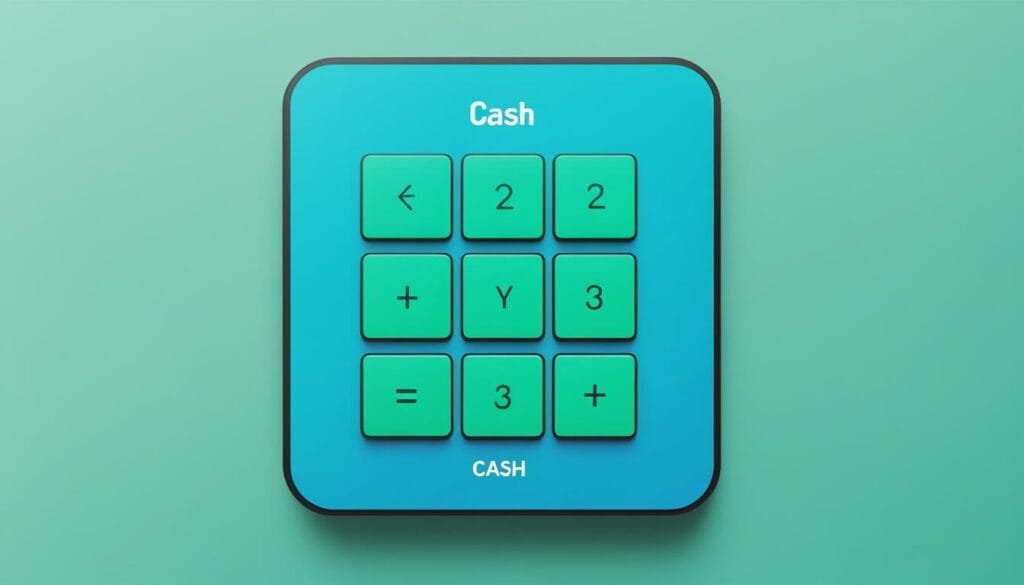Did you know Venmo has over 52 million users as of 20201? This shows how fast digital payment solutions are growing. We’re going to look at how CashApp compares with other apps in terms of fees and costs.
Mobile payment apps have changed how we handle money. CashApp, Venmo, PayPal, and Zelle are big names with different fees and features. For example, CashApp charges 3% for using a credit card, but Venmo only takes 1.9% plus $0.10 for business deals2. These fees can really affect what app people choose for digital payments.
It’s important to know the fees each app charges. Things like transaction limits and instant transfer fees can add up, especially for those who use payments a lot or run a business.
Key Takeaways
- Venmo leads with over 52 million users, showing how popular mobile payment apps are
- Fees vary a lot between apps, affecting the cost of transactions
- Transaction limits change for verified and unverified accounts on different apps
- Instant transfer fees differ in amount across various platforms
- Keeping transactions safe is key for using digital payments
Introduction to Mobile Payment Apps
Digital payments have changed how we send money, making it easier and more convenient. Mobile payment apps have changed our financial lives. Now, we can split bills or buy things online with just a few taps.
The rise of digital payments
Mobile payment apps have become very popular lately. They let you send money quickly and easily. Apps like Cash App and Venmo offer cheap ways to send money and now help businesses too3.
Overview of popular payment apps
Many payment apps are out there, each with its own special features and prices:
- Cash App: Available in the US and UK, offering instant transfers and business account options3.
- Venmo: Only for US users, it has a social network and lets you send money with fun stickers3.
- Zelle: A bank-backed option with different daily sending limits based on your bank4.

Importance of comparing fees and features
It’s key to know the differences in fees and features of money transfer apps. For example, Cash App charges between 0.5% to 1.75% for fast transfers. Venmo also charges 1.75% for fast transfers3. Both apps add a 3% fee for using a credit card3.
Apps also have different security levels. Cash App and Venmo use strong encryption and two-factor authentication. Cash App even lets you use your fingerprint for extra security3. Cash App lets you send more than $1000 right away, which is more than other apps5.
| Feature | Cash App | Venmo | Zelle |
|---|---|---|---|
| Instant Transfer Fee | 0.5% – 1.75% | 1.75% | No fee |
| Credit Card Fee | 3% | 3% | N/A |
| Business Account Fee | 2.5% per transaction | 1.9% + $0.10 per transaction | Varies by bank |
| International Transfers | Available | Not supported | Not supported |
By looking at these details, users can pick the best app for their money needs and likes345.
Understanding CashApp and Its Fee Structure
CashApp is a mobile payment service that lets users send money, receive payments, and manage their finances. It’s known for its easy-to-use interface and many features.
What is CashApp?
CashApp is a digital payment platform that helps users send money, set up direct deposits, and pay vendors. It uses a unique $Cashtag for easy identification. This makes sending and receiving money simple.

CashApp’s Basic Fee Structure
CashApp’s fees are competitive and user-friendly. Personal accounts don’t have fees for transactions. But, business accounts have a small fee on received transactions6. Sending money with a linked credit card costs a 3% fee7.
| Transaction Type | Fee |
|---|---|
| Standard transfers to linked bank account | Free |
| Instant transfers | 0.5%-1.75% (minimum $0.25) |
| ATM withdrawals | $2.50 per transaction |
| Paper check deposit | $1 |
Additional Charges and Limits
CashApp has different transaction limits based on verification status. Unverified accounts can send up to $250 in seven days and $2,500 monthly. Verified business accounts can transfer up to $7,500 weekly6. If you get direct deposits of at least $300 monthly, you can get ATM fees reimbursed8.
For business accounts, CashApp has more benefits. They don’t pay Instant Deposit fees and have no limits on incoming funds. This makes it a good choice for small businesses and freelancers6.
Venmo: Features and Fees
Venmo is a top choice for peer-to-peer payments in the US. It has over 80 million users in 20239. Users love it, giving it a 4.4-star rating on Google Play and a 4.9-star rating on the App Store9.
For personal accounts, Venmo’s fees are simple. It takes a 3% fee for credit card payments109. Instant transfers cost 1.75% with a $0.25 to $25 fee per transfer109.
Venmo business accounts come with extra perks like invoicing and easy profile switching. These accounts have a 1.9% fee plus $0.10 per transaction9.

Venmo sets different spending limits based on account verification. Unverified accounts can spend up to $299.99 a week, while verified accounts can go up to $4,999.999. The weekly limit for sending money is $24,999.
| Feature | Personal Account | Business Account |
|---|---|---|
| Credit Card Fee | 3% | 3% |
| Instant Transfer Fee | 1.75% (min $0.25, max $25) | 1.75% (min $0.25, max $25) |
| Transaction Fee | Free for standard transfers | 1.9% + $0.10 |
| Weekly Spending Limit (Verified) | $4,999.99 | $24,999 |
Venmo only works with US dollars in the US, which limits its use abroad. But, it’s secure with two-factor authentication to keep accounts safe9.
PayPal: The Veteran of Digital Payments
PayPal has been a key player in digital payments for a long time. It offers a wide range of services for both personal and business needs. This makes it a top pick for many users.
Fee Structure for Personal and Business Accounts
PayPal’s fees depend on the account type and the transaction. For personal accounts, sending money within the US using your PayPal balance or bank account is free. But, business transactions come with a 2.99% fee plus a fixed amount for online payments11.
| Account Type | Transaction Type | Fee |
|---|---|---|
| Personal | Domestic (PayPal balance/bank) | Free |
| Personal | Credit Card Funded | 2.9% + fixed fee |
| Business | Online Payments | 2.99% + fixed fee |
International Transaction Fees
For sending money abroad, PayPal charges extra. This includes a 4% currency conversion fee, making it pricier than some other options for sending money across borders11. Yet, PayPal’s wide global reach makes it a good choice for international payments. It’s unlike some services like Venmo, which only works in the US12.
PayPal’s Unique Features
PayPal is known for its buyer and seller protection policies, which makes it a favorite for online shopping13. It also offers credit options and is widely accepted around the world. For businesses, PayPal has Zettle, a mobile payment system for taking payments in person11.
PayPal has many benefits, but users should know that accounts can be suspended anytime. This could freeze your funds for a long time due to strict rules11. This is something to think about when picking a payment service for your PayPal business account.
Zelle: The Bank-Backed Alternative
Zelle is a standout in the digital finance world as a bank-integrated payment service. It doesn’t charge fees for sending or getting money, which is great for those watching their wallets. This is because banks cover the costs.
Zelle is known for its speed. Money moves between Zelle-enabled accounts in minutes, beating many others. This fast transfer is perfect for when you need to send money quickly.
Zelle’s limits on transactions depend on the bank but are often higher than other apps. This means you can send more money when you need to. It suits a variety of financial needs.
But, Zelle isn’t perfect. It doesn’t offer some features like international transfers or tools for businesses. Also, you can’t use credit cards for payments, which limits how you can fund your transactions14.
Security is a big deal for Zelle. If you lose your device or forget your password, you’re only on the hook for $50 if you tell them within four days15. But, Zelle does collect personal info like your profile picture, where you are, and your bank details15.
Zelle’s link with banks gives it a unique edge in mobile payments. Its no-fee and fast transfer options are great for those who value speed and saving money in their payment services16.
Comparing CashApp fees with other payment apps
When it comes to digital payments, knowing about fees is key for finding the best deal. CashApp, Venmo, PayPal, and Zelle each have their own fee systems. They serve different needs and transaction types.
Transaction fee comparison
CashApp and Venmo have good rates for business deals. CashApp charges 2.75%, and Venmo takes 1.9% plus $0.10 per transaction17. PayPal’s fees are higher, with a 2.9% plus fixed fee for domestic USD payments funded by card18.
For personal transfers, CashApp and Venmo both charge a 3% fee with a credit card. PayPal’s fee is 2.90% plus $0.30 for the same service1719.
International transfer capabilities and costs
International money transfer fees differ a lot. CashApp only works for US to UK transfers, with a 3% to 4% currency conversion fee18. Venmo doesn’t do international transfers. PayPal has the widest global reach but costs more, with a 5% fee for international transactions plus a currency conversion fee1819. Zelle is free for domestic transfers through certain banks but doesn’t go international.
Instant transfer fees across platforms
For those who want fast transfers, the cost is important. CashApp charges 0.5% to 1.75% for instant transfers, with a $0.25 minimum fee17. Venmo’s instant transfer fee is a flat 1.75%, capped at $2517. PayPal’s instant cashout option has a 1.75% fee of the transfer amount19. These fees show the trade-off between speed and cost in digital payments.
FAQ
What fees does CashApp charge for business transactions?
How do Venmo’s fees compare to CashApp for business transactions?
What fees does CashApp charge for business transactions?
How do Venmo’s fees compare to CashApp for business transactions?
FAQ
What fees does CashApp charge for business transactions?
CashApp takes a 2.75% fee for taking payments. This fee is taken before the money gets to your account.
How do Venmo’s fees compare to CashApp for business transactions?
Venmo has a 1.9% +
FAQ
What fees does CashApp charge for business transactions?
CashApp takes a 2.75% fee for taking payments. This fee is taken before the money gets to your account.
How do Venmo’s fees compare to CashApp for business transactions?
Venmo has a 1.9% + $0.10 fee for each business transaction. This is less than CashApp’s 2.75% fee.
What are PayPal’s fees for personal and business transactions?
PayPal doesn’t charge a fee for domestic payments from your balance or bank. But, using a credit card costs 2.9% + a fixed fee. For businesses, online payments cost 2.99% + a fixed fee.
Does Zelle charge any fees for sending or receiving money?
Zelle usually doesn’t charge fees for sending or getting money. The costs are often covered by the banks involved.
How do instant transfer fees compare across CashApp, Venmo, and PayPal?
CashApp’s instant transfer fees range from 0.5%-1.75%. Venmo charges 1.75% (up to $25). PayPal takes 1.5% of the transfer amount.
Which payment app offers the best international transfer capabilities and fees?
PayPal is great for sending money abroad but has higher fees, like a 4% currency conversion fee. CashApp only works in the US and UK. Venmo is for US transactions only, and Zelle doesn’t send money internationally.
What are PayPal’s fees for personal and business transactions?
Does Zelle charge any fees for sending or receiving money?
How do instant transfer fees compare across CashApp, Venmo, and PayPal?
Which payment app offers the best international transfer capabilities and fees?
.10 fee for each business transaction. This is less than CashApp’s 2.75% fee.
What are PayPal’s fees for personal and business transactions?
PayPal doesn’t charge a fee for domestic payments from your balance or bank. But, using a credit card costs 2.9% + a fixed fee. For businesses, online payments cost 2.99% + a fixed fee.
Does Zelle charge any fees for sending or receiving money?
Zelle usually doesn’t charge fees for sending or getting money. The costs are often covered by the banks involved.
How do instant transfer fees compare across CashApp, Venmo, and PayPal?
CashApp’s instant transfer fees range from 0.5%-1.75%. Venmo charges 1.75% (up to ). PayPal takes 1.5% of the transfer amount.
Which payment app offers the best international transfer capabilities and fees?
PayPal is great for sending money abroad but has higher fees, like a 4% currency conversion fee. CashApp only works in the US and UK. Venmo is for US transactions only, and Zelle doesn’t send money internationally.
Source Links
- https://spero.financial/venmo-cash-app-and-zelle-are-mobile-payment-apps-safe-to-use/
- https://nosh.ng/blog/cashapp-vs-venmo-vs-zelle-vs-paypal
- https://rates.fm/payment-systems/cash-app-or-venmo/
- https://paymentcloudinc.com/blog/zelle-vs-cash-app/
- https://webvator.com/why-do-people-prefer-cash-app-over-paypal/
- https://currenciap.com/cash-app-for-business-vs-personal/
- https://www.remitfinder.com/blog/complete-guide-to-cash-app-fees-and-charges
- https://www.forbes.com/advisor/money-transfer/what-is-cash-app/
- https://liquidity-provider.com/articles/venmo-vs-cash-app-which-is-better/
- https://www.forbes.com/advisor/money-transfer/cash-app-vs-venmo/
- https://thecontractshop.com/blogs/posts/stripe-vs-square-vs-paypal
- https://pennypinchinmom.com/comparing-cash-app-to-google-pay-zelle-venmo-and-paypal/
- https://gadgetmates.com/cash-app-alternatives
- https://www.nerdwallet.com/article/banking/peer-to-peer-p2p-money-transfers
- https://www.consumerreports.org/money/digital-payments/peer-to-peer-payment-apps-comparison-a5999129619/
- https://www.cnbc.com/2022/04/11/how-to-use-peer-to-peer-payment-apps-like-venmo-cash-paypal-zelle.html
- https://nosh.ng/blog/cash-app-vs-venmo
- https://wise.com/us/blog/cash-app-vs-paypal
- https://thecollegeinvestor.com/41686/cashapp-venmo-zelle-paypal/

